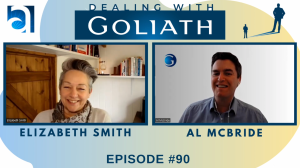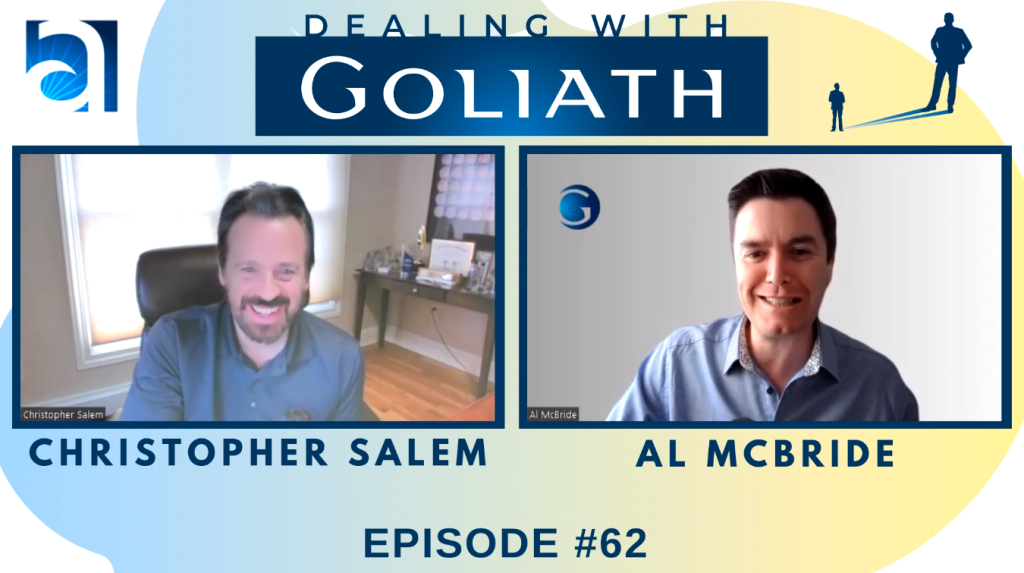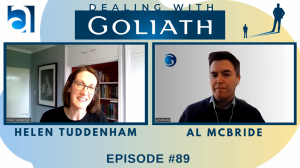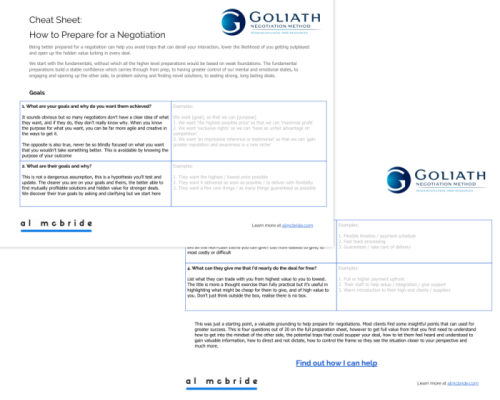

Emotional Intelligence for Effective Leadership with Chris Salem #062
Show Notes:
Christopher Salem is an accomplished CEO, Business Growth Strategist, Professional Keynote Speaker, Award-Winning Author, Business Trainer, and Radio Show Host & Media Personality dedicated to empowering business owners businesses to boost their brands and business simultaneously from ordinary to extraordinary.
His goal is straightforward – to help serious business owners foster better workplace environments that lead to higher engagement and retention with staff while generating more clients, increasing customer experiences, and scaling their overall revenue and profits quickly and inexpensively.
Over the years, he has developed a keen understanding of the complex issues facing small business owners. His experience has helped him develop skills to educate business owners quickly and effectively to successfully apply the right strategies in the correct order, allowing them to grow their business to its maximum capacity.
His book Master Your Inner Critic / Resolve the Root Cause – Create Prosperity went international best seller in 2016. He also co-authored the recent edition to “Mastering the Art of Success” with Jack Canfield. His weekly radio shows, Sustainable Success is part of the Voice America Influencers Channel and Business Influencers with Tal Radio, part of the Touch-A-Life foundation.
Topics explored:
- Vulnerability is a strength not a weakness
- It all starts with self-awareness, critical to being coachable
- Looking at a situation how it is not just how it should be, being transparent
- The power of choosing your response not falling into emotional reaction
- The importance of really connecting with your clients
- The power of asking questions
- Stop living in the past or the future that’s where the fear lies, live in the present
- Swap your expectations of being too attached to an outcome and choose your intentions instead
- Ask your prospects Questions! Uncover their pain and their situation, build rapport and trust to get at the real issues
Transcript
Al McBride 0:01
welcome to the dealing with Goliath podcast. The mission of dealing with Goliath is to sharpen the psychological edge in negotiation, ethical influencing and high impact conversation for business leaders who want to be more effective under pressure, uncover hidden value, and build greater connection, all while increasing profitability. This is the short form espresso shot of insight podcast interview to boost business performance, using our five questions in around about 15 minutes format.
My guest today is Christopher Salem. Chris is an accomplished CEO, Business Growth strategist professional keynote speaker, award winning author, business trainer and radio show host and media personality dedicated to empowering business owners, businesses to boost their brands and business simultaneously. from ordinary to extraordinary. His goal is straightforward to help serious business owners foster better workplace environments that lead to higher engagement and retention with staff while generating more clients, increasing customer experiences and scaling their overall revenue and profits quickly and inexpensively.
Over the years, he’s developed a keen understanding of complex issues facing small business owners. His experience has helped him develop skills to educate business owners quickly and effectively successfully apply the right strategies in the correct order allow them to grow their business to his maximum capacity. His book master your inner critic, resolved the root cause create prosperity was an international bestseller in 2016. He also co authored the recent addition to mastering the art of success with Jack Canfield.
His weekly radio show sustainable success is part of the voice America influencers channel and business influence with Tao radio, part of the touch of Life Foundation, while Chris has a huge amount of talking points, right? Well.
Christopher Salem 1:59
Well, Alistair, thank you so much for having me. It’s a pleasure to be here.
Al McBride 2:03
Well, it’s it’s absolute pleasure to have you. So let’s dive straight in. So there’s a lot going on. So who would you say is your ideal client, and what’s the biggest challenge they tend to face?
Christopher Salem 2:13
Well, for me, the ideal client is someone that understands that there is a problem, you know, they instead of, you know, managing the problem, they recognize that they’re, you know, they’re looking to do something, finally to do something about it to find a solution. So they have to be open minded. And they have to be coachable. Because if they’re not open minded and coachable, then it’s going to be very difficult to not only address the problem, but then together create a solution that will allow them to, you know, find a more sustainable path towards the results that they’re seeking. So really important for me, it has to be that they’re open. Right, they have to recognize there is a problem, open minded and be coachable.
Al McBride 2:54
Excellent, I have to ask, you must have a hole at this stage in your career with all the experience, you must have a whole other little tick boxes or the opposite red flags as to when people are not.
Christopher Salem 3:05
Oh, yeah, I mean, one of the things that I’d make very, very clear with people is if they’re looking to check off a box, or manage the problem, I’m not there guy.
Al McBride 3:16
Okay. Okay. Yes, very interesting. Because the question is, a lot of a lot of the audience might be listening, they might be in their pre stage, they might be, they could be a prospect of yours potentially down the line. But what are some of the common mistakes people make when they’re trying to solve that problem? Just before they come to you? What are they trying to do that’s not working for them?
Christopher Salem 3:41
Well, what I find is, a lot of times, they’re just trying to manage the problem. And kind of like, check off a box cover their asses, they acronym, you know, see why a, because in order to really address a problem, you have to be transparent, you have to be open, you have to be able to admit, what are what are, what is the situation for what it is? What is the role that I play in here?
What are the strengths, what are my weaknesses, and assess that for everybody else that’s involved, so we can see how we can go about fixing it. Another issue would be that a lot of times, people tend to get caught up in the control, they can’t control. They’re not focused on what they can control. This is why we experience the feeling of being worried, feeling stressed, feeling anxious, being frustrated.
And so you have to recognize the situation for what it is not what you think it should be. So that’s what’s very, very important how you think, first, to look at the situation for what it is, what can I do to maximize it, and make sure that I’m being transparent and vulnerable and open to do something to correct it, versus looking at it for what it should be. And this is where people tend to kind of check boxes, kind of not avoid certain things exposing them selves in that type of thing.
Al McBride 5:01
Very interesting because it sounds like as you said, a lot of people might fall into that avoidance mentality, oh, it’s difficult, it’s messy. It’s
Christopher Salem 5:08
not my problem, somebody say, until management does something I, you know, I’m not going to do anything, people are people are looking for the change outside of themselves, not from within change comes from within. Regardless if other people are involved, you can’t control that you have to change make be that change yourself.
Al McBride 5:28
I love that, because it’s it’s such great wisdom, it’s something I’ve heard from quite a few different directions lately. And it’s just reminded me the same that, you know, if you want to change, if you want to look at how to move towards solutions, start with yourself start with water is in you that’s potentially contributing to the problem, and go from there. So I love that because it sounds like you require a certain level of, firstly, of humility in your clients, but also a certain level of self reflection mixed with that they’re able to actually say, Okay, where am I, because nobody’s perfect, but
Christopher Salem 5:59
nobody’s perfect. Nobody, regardless of title, and just what you said, Alistair, it starts with self awareness. Because without self awareness, we can’t because I can’t change what you’re going to do, I can’t control what you’re going to do. If we are working together, I can only control what I can do, and then be the example and be a resource for that for you to do for yourself. And vice versa. This is what creates an interdependent work environment or culture, that where people can come together to complement one another, not depend upon each other.
Al McBride 6:35
I love that. As you said, it’s that compliment. We’re, as you said, that used a great word there earlier, which is that vulnerability, I’m a great believer in strengths. Through vulnerability, people feel vulnerable from vulnerability was actually a huge, it’s nearly a superpower if you can do right, why isn’t it?
Christopher Salem 6:52
Yes, it is. I mean, I grew up look, you know, where I was led to believe that vulnerability was a weakness, you know, and it took me 30. Well, it took me over 31 years after I would turn, I think it took me three years to realize after I started this transformation with myself to realize that vulnerability was a strength and without being vulnerable, how could I get to the root cause of the things that were holding me back in order to now correct them? And then, you know, change my way of thinking to, you know, improve my skills proved, by the way, I look at things, how we think, and how I take action to move forward.
Al McBride 7:28
Excellent. It sounds like that ties in very much with as a key principle, right at the base for how you have that staff, greater staff retention, how you have the greater customer or client retention, does it play right through across the board.
Christopher Salem 7:46
Yes, I mean, again, you know, the thing about, you know, when you’re looking to you know, incite change, you have to be that example, regardless of title, you have to take that responsibility to be that change for yourself. How can you look at things and think in a different way, it starts with the way we think, many people are programmed to operate from expectations and expectations are caught up with attachments, emotional attachments, to results in outcomes.
But what ends up happening is with expectations, we put more emphasis and power into the things that we can’t control situations and other people. And because you’re in the past, in the future with that fear thrives there. So you’re operating in from fear in the past in the future, rather than the moment when it’s better to operate from intentions, not expectations, because that allows me to now to focus on what I can control, trusting the process of what you know what I can’t control what I can’t control, that will lead to the results that I seek.
Al McBride 8:49
Sounds like there’s a lot of awareness of presence, both, you know, being in the present tense. But as you said, it’s that dangerous instead of living too much in the past or in the future, as he said, that’s where the fear resides.
Christopher Salem 9:02
Yes. And that’s what unfortunately, the how most people live their lives and how most organizations run is by fear. And people don’t realize that they’re thinking this way in the past and future. They have attachments to emotional attachments to the outcome and results. That’s what the expectation is. But what they don’t realize is they’re putting more power and emphasis and energy into the control they can control. And this is why people react to situations instead of respond. Big difference.
Al McBride 9:34
Oh, let’s clarify that one because I love it. Yeah, because, of course we don’t want to be too reactive. But what would you do then describe the differences as respond versus react that’s a great point.
Christopher Salem 9:45
Because we can control our emotions. There are five things we can control as human beings, our communication to ourselves and others behavior attitude, it’s happening for you, not to you emotions, learning how to respond versus react in action. What respond me means is that, that if somebody, something happens that might trigger an emotion, it might be that it upset you, you’re angry, it’s okay to feel that way. There’s nothing wrong with that, you know, you’re angry.
But instead of now reacting from that primary emotion of anger, which is not going to help the situation, whether if you verbally come back, or type an email and response back in this case, in this country, you’re reacting, I can pause and take a breath and say, What can I control in this situation? What can I not control.
Now, if I feel composed enough to now respond from a secondary emotion, positive, that I can, if I have to remove myself for 10 minutes, I removed myself come back, if I have to sleep on it, come back the next day, I can do that. But I find that when we can respond, rather than react from a positive emotion doesn’t mean we negate the negative emotion that you’re experiencing. We’re able to be better problem solvers, and create solutions and better ideas from those situations, or where people are involved.
Al McBride 11:06
Definitely, I mean, because the anger, you use anger as an example, or disappointment, or whatever, that emotion disappointment. Yeah.
As you said that, you know, people like anger, because you feel empowered. But as you said, You’re not very creative. When you’re,
Christopher Salem 11:20
you’re not creative, you’re just it’s like, it’s like, it’s like, if there was a fire, you’re just pouring more gas on it. That’s all I
Al McBride 11:27
love that distinction, you know, and it’s a great one to point out to the audience. So thank you for that, you are choosing your response, rather than just living in the reaction. So which, as you said, it’s getting you out of fight or flight as well, it is,
Christopher Salem 11:42
there is a power in the pause, take a deep, just take a breath. And then if you feel like hey, I can read, I can respond favorably from a secondary emotion. And I can set it gives you now time to address the primary motion on your own. If you have to deal with some of the if you feel upset and angry. Again, you might be able to calm yourself down and see it for what it is not what you think it should be. When people react from negative emotions. It’s because of what they think it should be, instead of looking at a situation for what it is, and then maximizing what you could control with it.
Al McBride 12:21
Love it, because it puts you back in control. Yes. Well, what you can control as you said,
Christopher Salem 12:27
What you can’t control everything. But yes, yeah,
Al McBride 12:31
it’s like, you can’t control the river, but you can you can get on the boat and steer the time. Excellent. Excellent. I love that. Because you know, a lot of my a lot of my clients is, you know, a lot of people that follow are in and around a lot of negotiation. And it’s something that great negotiators often push their buttons, they can find the buttons together, emotional for these things.
And it is exactly that being able to play, we’re able to roll with that and get into the higher self, as he said of the fight or flight into the higher self to make those more creative, sometimes even playful decisions to be much more your best self so that that’s excellent stuff. So what might be one valuable free action that the audience could implement that will help with these issues. So this may not solve the problem, but at least put them looking in the in the right trajectory? We’ve touched on quite a few there already. Yeah,
Christopher Salem 13:27
I mean, there are many different resources. I mean, if you work for a company, you could tap into your EAP, your employee assistance, provider resources, for things on emotional and mental well being there are a lot of resources on that even pertaining to emotional wellness. You can download calm or headspace and just learn about how can you learn to be present? How can you learn to retrain your mind to think in the moment rather than the past in the future.
Because if you find yourself anxious, worried, frustrated on a regular basis, that is just a telltale sign you’re operating in the past in the future, to expectations and you’re, again looking at things for what you think it should be, rather than what it is bring it into the moment, focus on intentions instead. And just trust the process, that things will work out if you focus on what you can control. That’s it. So calm and headspace offer some free resources that a free yourself that you can learn to be more present.
Al McBride 14:29
And such a great point that the headspace you know, mindfulness exercise only tend to eat only has to be 10 minutes a day. It doesn’t have to be you know, half an hour. And as you said, scientifically proven to create that space so that we’re just less reactive and more as you say, able to choose our response to whatever comes up during the day. So it’s such a great point. Such a great point. literally putting you back in control. So I think it’s worth that 10 Whatever it is, what is it $10 a month isn’t he’s not.
So best, that’s $10 you might spend Excellent. So what might be one valuable free resource that you could direct people to that will help with that issue? Because you have an awful lot of wealth of things on your, on your website, and you have all your books and your radio show? Is there anything in particular that maybe they could check out?
Christopher Salem 15:21
With me, I mean, with me, it’s just connecting with me, okay. I mean, there’s no obligation at all, even though I’m a coach, there’s no obligation, I love to meet new people. And a lot of times, I’m just sharing, I’m sharing. And if I get to know somebody, and I can share something, it can maybe plant a seed, or maybe get you to think about something that you can change, and how you look at things, you know what to what we’re talking about here.
So there are plenty of different resources. But I always find that when we can have conversations with people that have, like, made these changes, and have been operating from this way of thinking for a long time, those are the best best people to surround yourself with. And I know I did with people that taught me and I’m simply just giving it back.
Al McBride 16:09
Awesome stuff. Awesome stuff. That’s fantastic. So what would be your number one insight or principle on how to negotiate and by negotiate? I mean, that’s sort of more the human side that I talked about building beta rapport and connection, uncovering hidden value and opportunity with your counterparts. Do you have any particular thoughts that you often give to your clients or around that? Yeah,
Christopher Salem 16:35
I would just say that again, you know, when you when you talk to people ask questions. Mm hmm. You know, ask a question, even if you’re even if you’re looking at when you’re looking to build rapport and get to know somebody, what’s really important to them? What is their challenge? Maybe they’re not sure what it’s important to them what their challenge. But by asking questions, you can uncover this information. This could be what colleagues, somebody who worked for customers, but here’s what’s even better, especially for people that are in sales, you can still interject what you’re looking to come across in terms of something that they can benefit from what you’re offering, but do it through the power of questions.
When you tell people things, or you know, direct certain things that people, they’re going to put walls up. But if we can now, ask a question, look them in the eye, and listen, truly listen, to relate and understand. It’s quite powerful, it builds rapport. And when you build rapport, you’re more likely to know people feel more comfortable or vulnerable in a healthy way to now open up so we can find out where are the bottlenecks?
Where are the problems, things that are getting in between us that are not making us be able to work efficiently together. Now we can solve what that is to move forward. And for customers to feel more comfortable with us that we can uncover what’s really important to them, to help them move forward as well.
Al McBride 18:05
That’s outstanding advice, Chris, because yeah, you’re spot on. I love that asking the question is listening to what you said earlier, being present listening to the answer, because those are the stepping stones, that rapport is what builds trust. And that’s when you get to the real picture of as you said, as real, whatever your customer or clients real problem or struggles or challenges are and how you can actually help them effectively. So that’s Outstanding, outstanding advice. So thank you, Chris. Well, look, thank you so much for coming on the show. It’s been an absolute education in the short time we’ve been speaking. So thank you so much for that.
Christopher Salem 18:40
l sir. Thank you so much for having me. It’s been a pleasure to serve your audience here today.
Al McBride 18:46
That’s something so last quick question with where can people reach out to funny I linked to obviously, your LinkedIn below? Yeah.
Christopher Salem 18:54
Yeah. LinkedIn is a great place to connect. I mean, it’s just, you know, kind of informal way to connect. I have two websites, Christopher’s salem.com And then also sustainable success.net. But I would say LinkedIn is a great way or we can connect by email at Chris at Christopher salem.com.
Al McBride 19:15
Super stuff and all those links, of course will be pre beneath the podcast and beneath the video. So do reach out. He has some remarkable stuff on his website and check out the books and the radio shows huge amount of value there. So Chris, thank you so much.
Christopher Salem 19:31
Alastair, thank you so much for having me. Thank you.
Transcribed by https://otter.ai
Resources
Website: https://christophersalem.com
Book: Chris Salem & Jack Canfield, Mastering the Art of Success
Amazon Book: Christopher Salem, Master Your Inner Critic: Resolve the Root Cause, Create Prosperity
Chris’ Blog: https://christophersalem.com/blog/
Youtube: Sustainable Success with Chris Salem
Ready for more:
If you’re interested in more, visit almcbride.com/minicourse for a free email minicourse on how to gain the psychological edge in your negotiations and critical conversations along with a helpful negotiation prep cheat sheet.


